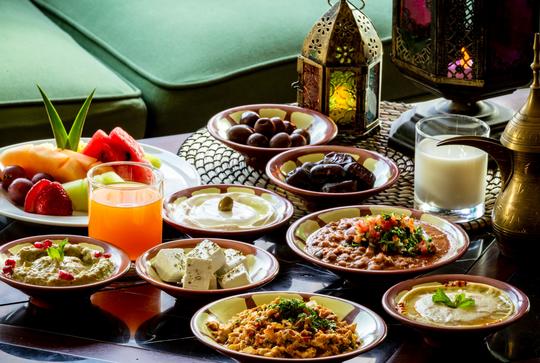Common Allergens in Ramadan Meals
Many foods traditionally eaten during Ramadan contain top 9 allergens. Here are some of the foods to be aware of as you celebrate Ramadan while living with food allergies.

Managing food allergies during Ramadan can be challenging as many traditional foods contain common allergens, in particular milk, wheat, tree nuts, and sesame. While every family has its own Ramadan food traditions and the menu varies across the world, we’ve listed some common menu items below for Iftar (the evening meal) and Suhoor (the pre-dawn meal).
Iftar (evening meal)
Muslims all over the world break their fasts with dates as was the tradition of the Prophet Muhammad. These could be reconstituted dried dates (often served in water or milk) or fresh dates. In many countries, larger varieties of fresh dates are commonly filled with almonds, pistachios, coconut, or covered in chocolate and nuts/sesame seeds.
During Ramadan, appetizers and soups take center stage on many tables.
Soups
- Harira. This tomato-based soup contains lentils and chickpeas. It’s often thickened with flour and may contain toasted vermicelli noodles and beaten or boiled eggs.
- Lisan al-Asfour. This broth-based soup relies primarily on orzo pasta.
- Adas. Although there are many varieties of lentil soup, some common ingredients include red or brown lentils, broth, oil or ghee, and toasted vermicelli noodles.
- Haleem. This popular soup contains wheat, barley, or lentils with a protein such as beef, mutton, goat, or chicken.
- Aush. This soup often contains lentils, chickpeas, noodles, and meat, and is traditionally topped with yogurt.
- Yayla çorbası. This soup is yogurt- and rice-based and may contain bouillon cubes and egg yolks.
Appetizers
- Fried or baked dumplings go by a variety of names such as sambousek, sambosa, samosa, brik, brouiat, boulani, manakeesh, or fatayer. These are made of dough (usually wheat-based) stuffed with various fillings (meat, cheese or vegetables such as peas, potatoes or pumpkin). These fillings may also contain additions such as raisins, cashews, pine nuts, or eggs, and may be cooked in clarified butter.
- Kibbeh. This Levantine meat-based dish is made of bulgur wheat, minced onions and ground meat. It may be served in a cooked yogurt-based sauce, baked in a casserole dish or eaten raw.
- Vada/Pakora. These vegetable-based appetizers are made with lentil or chickpea flour.
Salads
Fresh vegetable salads often contain fried bread (fattoush), bulgur wheat (e.g., tabbouleh, kisir), couscous, sesame seeds, or pine nuts. Cooked salads are often cooked in vegetable or olive oil but may be cooked with clarified butter. Also, salads may contain mayonnaise or boiled eggs as ingredients or toppings. Indonesian or Malaysian salads may also contain ingredients such as sesame oil, shellfish or peanut sauce.
Dips and Pulses
Many dips and pulses (e.g., hummus, mujaddara, muhammara, baba ghanouj) contain chickpeas or lentils pulsed with sesame seed paste or walnuts. Also, dairy based dips are popular (e.g., labneh) and those with a yogurt-base (mast-o-khiyar, Haleem bademjan, raita).
Main Dishes
Main dishes usually center around a rice or cracked wheat-based dish, which may be meat-based. Mahaashi (stuffed vegetables such as grape leaves, eggplant, zucchini, and cabbage) may contain rice along with ground meat or only herbs and vegetables.
There are many meat dishes that feature rice or cracked wheat that are cooked with either clarified butter and/and bouillon cubes and may be topped with fried onions or nuts (e.g., biryani, kabsa, machbous, ruz bi-shaariyya, freekeh, tahdig, harees, madrouba, maqlouba, mansaf). Fillings differ based on regional and personal preferences. Indonesian or Malaysian varieties could also contain sesame oil and/or shellfish
Curry or sauce-based dishes, whether meat or vegetable centered, may include ground nuts, fried onions, cream, shellfish, sesame seed oil, coconut milk, clarified butter, or bouillon cubes. Rice porridges may also contain common allergens.
Desserts
Ramadan is the season for sweets. They often have a hint of rose water and rely heavily on sugar syrup infused semolina (basbusa) or flour (basbousa, qatayef) or both (kellaj) with a filling of nuts, raisins, coconut, and milk products such as cream (umm ali).
Sweet pastes/pulses, like halva, often contain ground sesame seeds, almonds or other nuts. Popular fried sweets and cookies such as chebakia, zellabia, lugeimat, gulab jamun, and jelabi are flour-based, may contain curd or clarified butter, and can be topped with sesame seeds, almonds or pistachios.
Custards and rice puddings (mahlabiyya, ruz bi-laban, qamar eddeen) are also popular and may contain dairy, flour, nuts, or coconut as fillings and/or toppings.
Drinks
There are many traditional Ramadan drinks made either from dried fruit pulp or paste (apricot juice/qamar eddeen; tamarind/ tamr hindi), fruit syrup (grape molasses, grenadine, and rose water/jallab; grape, raspberry, black currant syrup/Vimto), dried leaves (kerkadeh/hibiscus), or roots (licorice/arq essous). Yogurt-based drinks, either savory (salty doogh/ayran/leben) or sweet (fruit lassis), are also popular.
Some drink may be topped with nuts or contain thickening agents in either the pulp/paste or the prepared drink itself. Also, in traditional open-air markets, the source ingredients may be stored near nuts and cross-contact may occur.
Suhoor (pre-dawn meal)
Suhoor often includes dates, leftovers from the previous night’s iftar meal, and a variety of typical breakfast items such as pastries with nuts or dairy, rice/couscous/or semolina porridge, and egg-based dishes. Porridges may contain nuts or milk, with the possibility of shellfish in Indonesian or Malaysian versions.
Suhoor may also feature fried fava bean or chickpea cakes (taameya, falafel). This is often accompanied by stewed fava beans (fuul), which may have been cooked with lentils or flavored with sesame seed paste. Yogurt and yogurt-based smoothies are also common.
Most tables would be incomplete without a few types of fresh bread. These may be made with wheat flour (pita, meshtah, pide, naan, lavash) or semolina (harsha) and may contain sesame seeds or clarified butter (paratha, fateer).
Ramadan Mubarak.


